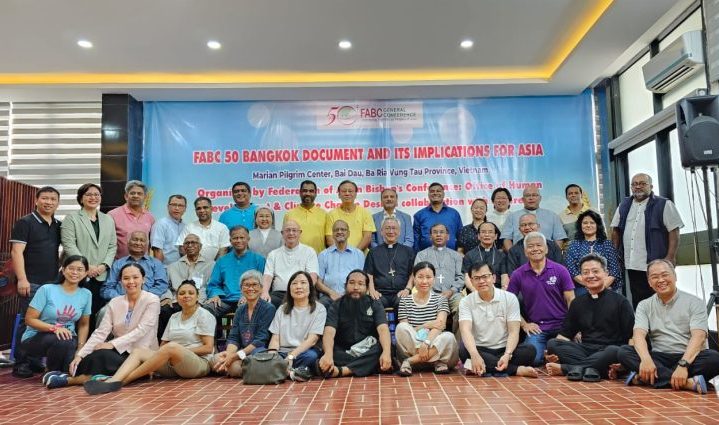A weeklong conference of Asian Church leaders has expressed concern over the shrinking democratic spaces in several countries in the region.
The conference, held from June 5-10 at Marian Pilgrim Centre Bai Dau in Vang Tau City, Vietnam, regretted that the rulers in those countries have become totalitarian, violating their citizens’ basic rights and instilling fear among civil society groups that champion the cause of the people.
The meeting noted that wider surveillance and threatening national security laws are being employed to silence the voice of the voiceless and the media, who stand for the rights of the poor and marginalized.
The conference focused on the FABC 50, a document issued by the Federation of the Asian Bishops’ Conferences (FABC) on its golden jubilee, and its implications for the region.
Another common concern in the region is migration, which forces people to leave their countries due to economic compulsions and search for better opportunities. The conference highlighted that the local Church fails to protect and safeguard those on the move. The conference emphasized the urgent need to address the issues faced by the families left behind and the abandoned children of migrants.
The participants also observed a widening rich-poor gap in most Asian countries. The number of poor people and child labor has increased in the post-Covid-19 period due to the government’s pro-rich policies. The conference attributed low minimum wages and the informalization of the workforce as reasons for the unequal distribution of wealth among the population.
Religious fanaticism was identified as another pressing issue, with many countries witnessing intolerance among different religious groups and attacks against minorities, particularly Christians, who are minorities in several Asian countries.
The conference expressed regret over the “my religion is better” attitude, which limits space for dialogue, encounters, and learning between religions and cultures.
The meeting also addressed ecological concerns and called for action to “Save Mother Earth.” The participants lamented that modern life and its luxuries have been built at the expense of nature. Globalization, urbanization, and digital technology have caused significant disruptions in the lives of families, especially among youth and children.
The conference concluded with a resolution to build bridges between different Asian countries by fostering a sense of consciousness and awareness that “we belong to the Asian Church.”
The conference drew inspiration from the Vietnam story of the Church in Asia. It began with a Mass at the chapel of the Martyrs’ Tomb in the diocese of Ba Ria, led by Bishop Emmanuel Nguyen Hong Son of Ba Ria.
During the conference, participants were informed about the history of the local Catholics who were detained in four prisons of Dat Do, Long Dien, Long Tan, and Phuoc Le by the Nguyen Dynasty. In 1862, when French troops attacked Ba Ria, the king’s soldiers fled and set fire to the prisons, resulting in the deaths of 288 men, 102 women, and 54 children under 10.
The Tomb of Martyrs Church was built as a memorial for the martyrs on the foundation of Phuoc Le prison in 1865. Between 1630 and 1886, an estimated 300,000 Christians were martyred in Vietnam.
Bishop Emmanuel highlighted that the martyrs endured some of the most brutal torture in Christian history.
Bishop Emeritus Allwyn D’Silva of Bombay, the chairperson of the Office of Human Development and Climate Desk of FABC, recounted the birth of FABC in 1970.
In Manila, the capital of the Philippines, Saint Pope Paul VI attended a meeting where 180 Catholic bishops of Asia came together. The meeting decided to establish an episcopal conference for Asia.
“Our predecessors came together with a passion and aspiration to foster greater collaboration among the different Asian countries in response to
the changing situation,” Bishop D’Silva said.
The FABC 50 document reflects the collective hope of the Church in Asia. It echoes the same passion and aspiration to listen to the voice of the Holy Spirit. The bishop emphasized that the FABC has journeyed together with the people of Asia.






